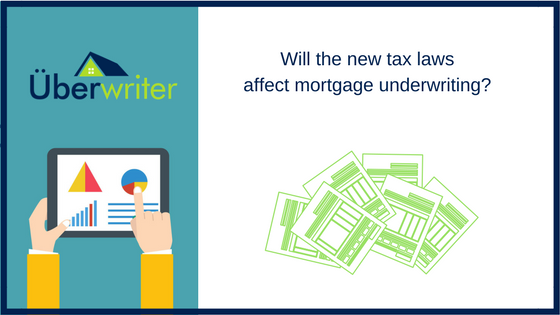Welcome to our first blog of 2018, this marks our fourth year of creating content focused on the topic of mortgage underwriting! There are many guideline changes already lined up at FHLMC alone, so this will be a busy first few weeks of 2018 with lots of topics to cover, so lets get started!
<h2>New Tax Laws Changing Underwriting</h2>
One of the more difficult skill sets to learn as an underwriter is evaluating a self-employed borrower’s tax return. The news is full of tax reform changes passed in December 2017. This brings up the question. How will the new tax laws affect underwriting? Before your email box gets filled with questions about this tax form and that form, I want to tell you some good news, and a little bit of bad news!
First the good news, most of the tax forms have not changed for 2017! Below I have provided links showing the 2017 forms.
<a href=”https://www.irs.gov/pub/irs-pdf/f1040sb.pdf”>SCHEDULE B</a>
<a href=”https://www.irs.gov/pub/irs-pdf/f1040sc.pdf”>SCHEDULE C</a>
<a href=”https://www.irs.gov/pub/irs-pdf/f1040se.pdf”>SCHEDULE E</a>
<a href=”https://www.irs.gov/pub/irs-pdf/f1040sf.pdf”>SCHEDULE F</a>
<a href=”https://www.irs.gov/pub/irs-pdf/f1120s.pdf”>112OS Business Returns</a>
<a href=”https://www.irs.gov/pub/irs-pdf/f1065.pdf”>1065 Business Returns</a>
<h2>The Bad News</h2>
Now for the bad news, the 1040 and the 1120 business returns forms are not yet published. This means there are changes to the forms likely due to the new laws. However, in my opinion there should be no changes that affect mortgage underwriting. I have completed extensive research on the 1040 and the 1120 forms and while there will be new calculations on the forms, the location of the income adjustments outlined in guidelines (i.e. depreciation) will not change.
One interesting change that I did not anticipate and will affect underwriting, the new tax law no longer allows a taxpayer who has alimony to deduct that income from the adjusted gross income. This new change flips the tax burden of alimony from the person receiving the income (who previously paid the tax) to the taxpayer who pays the alimony. This potentially means that alimony may be able to be grossed up as “non taxable” just as child support is now. This new change is only applicable on alimony awarded on divorces signed after Dec 31<sup>st</sup> 2018.
Another change that will impact underwriting is that borrowers can no longer deduct employment related expenses, that means the 2106 form is officially retired. Good news for borrowers qualifying conventional loans who have 25% or greater commissions, but bad news for those same borrower’s tax burden (but with the doubled standard deduction this still means tax cuts for those borrowers)
<h2>Summary</h2>
Bottom line the new tax laws will have some effect on underwriting. We had thought these new laws were going to require some rewrite to our UberWriter Income Analysis Software. As the final forms get published there may yet be some new line numbers or different calculations to be added.
Stay tuned as we keep you up to date on these changes and many more we are sure will happen in 2018!

